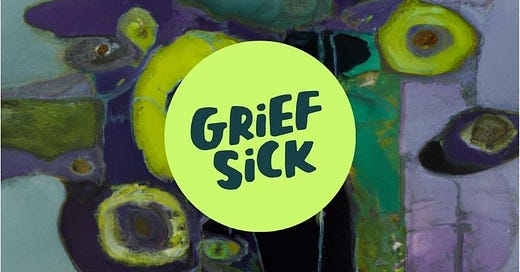#5: "Chronically ill people live in the territory of erosion"
A podcast interview about psychedelics, collective grief and surrender
I’m Emily, she/her, chronically ill (primarily with ME/CFS), chronic illness advocate,
grief-tender, regenerative organisational designer, coach and writer. Read about my journey in this interview, and about GriefSick in Edition #1.
A brief share
The lovely Daniel Moore interviewed me about GriefSick on his Post Exertional Mayonnaise* podcast, as the finale to his Grief Stories series.
We talked about
The origins of GriefSick (psychedelics!)
How “chronically ill people live in the territory of erosion” (Francis Weller)
Collective grief and the importance of witnessing
The differences between bereavement and chronic illness grief and the inadequacy of existing grief models when applied to chronic illness grief
Grief tending (I’ve recently trained in it), Francis Weller’s Five Gates of Grief and the transformative potential of grief
How chronically ill people are “energy time travellers”
My difficult relationship with acceptance, tolerance and surrender: “I have a lot of fight in me”.
An excerpt:
“It's hard for me to get a grasp on chronic illness grief, it's hard to see where the edges are. It's quite an oppositional relationship at the moment, where I'm trying to understand it through understanding what it isn't. It's not bereavement, it's not climate grief, so what is it?… Francis Weller is a therapist and a soul activist, he teaches and practices grief tending, I'm training with him at the moment. He says that chronically ill people live in the “territory of erosion”, a beautiful phrase, which is basically constant loss and constant readjustment, like the geological foundations are always shifting, always shrinking. There's times where I might get better but then I'll get worse again and so there's this kind of constant expansion and contraction. It is always changing and there's always new losses that are emerging or losses that you're understanding, because sometimes you might lose something but not really understand you've lost it till a little while later”.
You can listen wherever you listen to podcasts (e.g. Apple Podcasts) or watch on YouTube. Do check out the other interviews in the Grief Stories series.
*This is very funny if you have ME/CFS — for the benefit of those who don’t, it’s a pun on Post Exertional Malaise, the hallmark symptom of ME/CFS.
Fill in this short form if you’d like to guest-write an edition of GriefSick, be interviewed for GriefSick or collaborate in another way.
Email me at emily@emrosebaz.com if you’d like to commission me to write for your publication, speak at your event, invite me on your podcast or send me some feedback.
I suspect that GriefSick is not for everyone, all of the time. There have been points in the past eight years of my illness where I could not have engaged with this newsletter. Maybe that’s where you are now, and if so, I encourage you to protect yourself by not subscribing.
GriefSick is free. But if you enjoyed this post, please consider contributing to the Ko-Fi. 100% of KoFi payments go towards compensating GriefSick guest writers and illustrators.






I very much relate to this territory of erosion and the grief that comes with chronic illness. Mine provides me with all sorts of grief on a regular basis. It’s given me this feeling of not feeling strong enough to take on much more grief, I hope I grow stronger with time 💚
My partner is the one with chronic illness, but I find your posts very relatable and helpful for me too. My grief is not as direct as his, but I still have it. Grieving for him as well as the life we expected together. The confusion as symptoms ebb and flow; trying to keep up with whatever phase things are in.